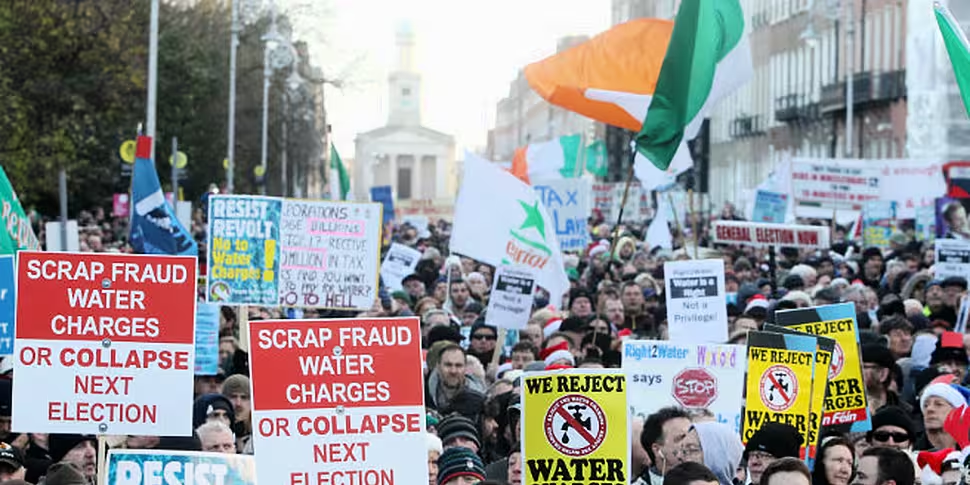When asked by Newstalk Breakfast presenter Ivan Yeats if Fianna Fáil is claiming victory as its negotiations with Fine Gael resulted in the drafting of a plan to end water charges, Fianna Fail TD for Cork North Central Billy Kelleher's answer was a firm 'No.'
He repeatedly referred to the issue of Irish Water as a "sore" which has been allowed to develop in Irish politics, one which could not be allowed to continue to fester any longer.
"The issue is that water became a very contentious issue over the last number of years" he told Newstalk, adding that it is "undermining" the work of politicians and "sapping the energy" from Irish politics.
Those on the further-left end of the political spectrum might take issue with that last point. The movement against Irish Water served to energise an anti-centerist vote in the recent General Election which saw the end of the Fine Gael / Labour coalition.

Barry Cronin / PA
90 out of the 158 representatives elected to the Dáil stood on anti-water charge platforms - and at the last official count in mid-January 61% of households had paid at least part of their water bills.
During the same interview, Mr Kelleher said: "If you want to bring in a charge there has to be a certain moral acceptance of it by the public. There has to be an understanding of why it's being brought in.
"I don't think in any of those cases that the Government convinced the public that the route that they were going in terms of water conservation, water charging and the establishment as a national utility was in the right direction. It is for that reason that it has been a running sore politically for the last number of years."
These are criticisms of the communication and management of the introduction of water charges, not a rejection of the idea of a fee. The roots of this generation of water charges go back to the Fianna Fáil / Green Party coalition who proposed both the introduction of water charges and the creation of a central body to manage water in the country.

Peter Morrison / AP / Security for a December 2014 water protest
Fudging the waters
The opposition parties and Left-leaning independents who ran on anti-water platforms in February's election called on voters to turn the 2016 General Election into a referendum on Irish Water.
It can be argued that the strength of the public backlash against both the principal of the charge, and the disorganised establishment of the entity and the implementation of charges forced Fianna Fáil into a position where it had to harden its position to "abolish Irish water and end water charges." In this case it wanted to replace it with a slimmed-down National Water Directorate.
Even Sinn Fein, the largest Left-leaning ground in Irish politics, has been accused of taking a soft stance in opposition to the charge as a result of growing support for anti-austerity Left wing groups. The party has refuted this claim.
A number of politicians are now accusing Fine Gael and Fianna Fáil of trying to 'kick this issue into touch' through the proposed establishment of a new commission.
There's #Dáil vote now on how the House deals with water charges today. Collusion between FF/FG means no real vote on water charges #dubw
— Ruth Coppinger TD (@RuthCoppingerTD) April 27, 2016
Beyond Water...
Much of the commentary surrounding days of mass water protests argued over two things, how many people showed up, and whether this was about more than water. The answer to the second question was 'yes' for at least a significant proportion of the participants who turned up with Greek flags, or placards with broader anti-austerity slogans.
Speaking to Newstalk ahead of the General Election, Anti Austerity Alliance TD Paul Murphy, who's by-election victory coincided with the beginning of the public movement against water charges, said that the development of the anti-Irish Water protest movement helped to mobilise a new Left vote.
The Dublin south-west representative said that the 'water issue' and demonstrations created conditions under which Fine Gael, Fianna Fáil and the Labour Party could no longer be treated with 'civility' by a significant proportion of the electorate who had been "radicalised" to some degree by the anti-water charge movement.
The election went on to reflect the increasing fragmentation of Ireland's political landscape as The Coalition's 'recovery narrative' was rejected by voters even as the Irish economy delivered the EU's highest level of economic growth.
The last eight week's messy negotiations serve as a reminder as to how far the country moved from the days when Fianna Fáil, Fine Gael and The Labour Party had combined support of more than 80%.
This scenario has no real winners between Fianna Fáil and Fine Gael as Irish Water looks set to enter a lengthy review process - but it does highlight the massive influence that the anti-water charge protest movement has had on Irish politics.









